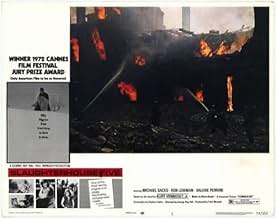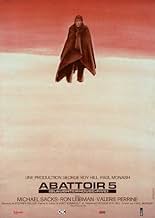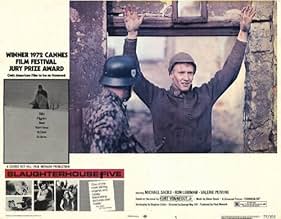IMDb-BEWERTUNG
6,8/10
14.419
IHRE BEWERTUNG
Ein Mann namens Billy Pilgrim erzählt die Geschichte, wie er in der Zeit hängen blieb und von Außerirdischen entführt wurde.Ein Mann namens Billy Pilgrim erzählt die Geschichte, wie er in der Zeit hängen blieb und von Außerirdischen entführt wurde.Ein Mann namens Billy Pilgrim erzählt die Geschichte, wie er in der Zeit hängen blieb und von Außerirdischen entführt wurde.
- Regie
- Drehbuch
- Hauptbesetzung
- Auszeichnungen
- 3 Gewinne & 4 Nominierungen insgesamt
Friedrich von Ledebur
- German Leader
- (as Friedrich Ledebur)
Ekkehardt Belle
- Young German Guard
- (as Nick Belle)
Empfohlene Bewertungen
There seems always to be something exhilaratingly depressing about Vonnegut's work. It's as if our lives were slowly coming apart at the seams. There always seems to be an element of tragic waste in his characters' lives, and never is the feeling more evident than in the book and film of "Slaugherhouse-Five." It's not surprising to learn that Vonnegut really did live through the firebombing of Dresden during World War II.
If there's a weak element of the film, it's the bombing itself. By never letting the audience see outside the bomb shelter Pilgrim was in (and if so, not making it vivid enough for me to remember it), the horror and sheer magnitude of the event is downplayed. Two hundred thousand people died in the destruction of one of the greatest, most majestic cities in all of Europe, and all we're given is a shaking camera. Those who've read the book know that the trajedy was conveyed all to well by Vonnegut's skillful, near-photographic descriptions of the event and its aftermath. Very little of it made it to the screen.
Aside from that, George Roy Hill does an excellent job of communicating the existential dread of what must have been thought to be an unfilmable novel. The fate of Pilgrim's wife through her reckless driving could have come off as tasteless black comedy, but any cheap laughs are thankfully avoided, and the sequence is as shocking as it is heartbreaking. The really far-out parts of the novel (the four-dimensional aliens, Vonnegut's conception of the future and the end of the universe) are done with complete seriousness; another director might have had a condescending approach to the material, and killed the magic. The novel, by itself, is one of the best I've ever read -- it gleefully trashes the rules of standard novel-making, narration, and continuity, and manages to tell a real whale of a tale (there's a lot of weird stuff to swallow in it.) When I saw Hill credited as director, I moaned in agony, recalling the headaches that were induced by his smug, syrupy box office smashes "Butch Cassidy and the Sundance Kid" and "The Sting." After those two, I gave up all hope in Hill, the same way I did with Richard Lester after "Petulia" and "Help!" By the end of the movie, however, I ate my words. It's a beautiful, thought-provoking, and enchanting film, and does justice to a fine novel.
If there's a weak element of the film, it's the bombing itself. By never letting the audience see outside the bomb shelter Pilgrim was in (and if so, not making it vivid enough for me to remember it), the horror and sheer magnitude of the event is downplayed. Two hundred thousand people died in the destruction of one of the greatest, most majestic cities in all of Europe, and all we're given is a shaking camera. Those who've read the book know that the trajedy was conveyed all to well by Vonnegut's skillful, near-photographic descriptions of the event and its aftermath. Very little of it made it to the screen.
Aside from that, George Roy Hill does an excellent job of communicating the existential dread of what must have been thought to be an unfilmable novel. The fate of Pilgrim's wife through her reckless driving could have come off as tasteless black comedy, but any cheap laughs are thankfully avoided, and the sequence is as shocking as it is heartbreaking. The really far-out parts of the novel (the four-dimensional aliens, Vonnegut's conception of the future and the end of the universe) are done with complete seriousness; another director might have had a condescending approach to the material, and killed the magic. The novel, by itself, is one of the best I've ever read -- it gleefully trashes the rules of standard novel-making, narration, and continuity, and manages to tell a real whale of a tale (there's a lot of weird stuff to swallow in it.) When I saw Hill credited as director, I moaned in agony, recalling the headaches that were induced by his smug, syrupy box office smashes "Butch Cassidy and the Sundance Kid" and "The Sting." After those two, I gave up all hope in Hill, the same way I did with Richard Lester after "Petulia" and "Help!" By the end of the movie, however, I ate my words. It's a beautiful, thought-provoking, and enchanting film, and does justice to a fine novel.
This is a workmanlike job of filmmaking. Many of the incidents and characters of the Kurt Vonnegut novel are in the film, but the filmmakers have not come up with a way of duplicating the novel's darkly comic tone, and the climactic firebombing of Dresden, the book's reason for being, is curiously unimpressive in the film. Michael Sacks is suitably sweet and blank as Billy Pilgrim and Ron Liebman gives frightening life to the maniacal Paul Lazzaro. Not showing us the Trafalmadorians, who abduct Billy and put him on display on their planet, seems a cheat.
There is a definite 70s feel to this production of a book that does an amazing job of spanning the most fascinating period of American history -- 1945-1970. I first saw this film in 1986 as a late teen at the height of Regan America, the cold war, nuclear detente. Billy Pilgram was the beginning of that world that I was just starting to pay attention to. The movie had a really profound effect on me at the time. Reading the book afterwards and getting into his other books, didn't detract at all from my assessment of the movie adaptation. Even seeing it now many years later doesn't detract from an amazingly solid film. The transitions as Billy gets unstuck in time are some of my favorite movie images. Also beautiful is the music which totally turned me on to Glenn Gould.
"Slaughterhouse 5" is perhaps the best book-film translation I've ever seen.
Let me safely say that Kurt Vonneguts 'Slaughterhouse 5' is my favourite book ever. It is incredibly funny and moving above any book I've ever read. But it is also a very complex and philosophical story with many deeply rooted undertones. As such, I strongly urge people to READ THE BOOK before you see this movie. A great many points are left unexplained to the viewer, assuming they have read Vonneguts version. As I read it beforehand, the movie didn't insult my intelligence by putting Vonneguts ideas in plain view. Instead, it relies faithfully on the viewers interpretations, not unlike the book.
Once again, unless you have a mind open like a 7-11, READ THE BOOK. Take my advice, and be immersed in the greatest story of the 20th century.
Let me safely say that Kurt Vonneguts 'Slaughterhouse 5' is my favourite book ever. It is incredibly funny and moving above any book I've ever read. But it is also a very complex and philosophical story with many deeply rooted undertones. As such, I strongly urge people to READ THE BOOK before you see this movie. A great many points are left unexplained to the viewer, assuming they have read Vonneguts version. As I read it beforehand, the movie didn't insult my intelligence by putting Vonneguts ideas in plain view. Instead, it relies faithfully on the viewers interpretations, not unlike the book.
Once again, unless you have a mind open like a 7-11, READ THE BOOK. Take my advice, and be immersed in the greatest story of the 20th century.
10mmoore18
Like most of those who have posted before me, I am an avid Vonnegut fan and went into this movie with a guarded optimism that it would just be decent.
But George Roy Hill did an excellent job conveying the overall feel of the book -- the time jumping was flawless and I didn't find it hard to follow at all. The actor who played Billy Pilgrim captured Billy's passive, calm and vaguely anti-social demeanor. Lazarro, Montana and Billy's wife are also well played.
George Roy Hill had a knack for directing movies made from great books -- e.g., "The World According to Garp" -- and in the end, I was pleasantly surprised how well this movie turned out.
As far as the Vonnegut adaptations go (I know of four -- this one, "Mother Night," "Breakfast of Champions" and the god-awful "Slapstick") this one is the best of the bunch.
I've always wanted to see a movie version of "Sirens of Titan," but it'll probably never happen -- so "Slaughterhouse Five" is my only chance to "see" Trafalmadore.
Recommended to any true Vonnegut fans. Other people probably won't appreciate it.
But George Roy Hill did an excellent job conveying the overall feel of the book -- the time jumping was flawless and I didn't find it hard to follow at all. The actor who played Billy Pilgrim captured Billy's passive, calm and vaguely anti-social demeanor. Lazarro, Montana and Billy's wife are also well played.
George Roy Hill had a knack for directing movies made from great books -- e.g., "The World According to Garp" -- and in the end, I was pleasantly surprised how well this movie turned out.
As far as the Vonnegut adaptations go (I know of four -- this one, "Mother Night," "Breakfast of Champions" and the god-awful "Slapstick") this one is the best of the bunch.
I've always wanted to see a movie version of "Sirens of Titan," but it'll probably never happen -- so "Slaughterhouse Five" is my only chance to "see" Trafalmadore.
Recommended to any true Vonnegut fans. Other people probably won't appreciate it.
Wusstest du schon
- WissenswertesAlthough Kurt Vonnegut Jr.'s renowned refrain, "And so it goes", appears over 100 times in the novel, it it is not uttered even once in this film.
- PatzerWhen Billy Pilgrim is asked by the American soldiers, "Where's your rifle?", he replies that he doesn't have one because he's a chaplain's assistant. However, in the United States Army, the primary duty of the chaplain's assistant in a combat zone is to protect the chaplain, so all chaplain's assistants must carry rifles. Because Chaplains are considered ministers in uniform they are forbidden from carrying weapons even when in combat zone.
- Zitate
Billy Pilgrim: [in his sleep] You guys go on without me. I'll be alright.
Prof. Rumfoord: All he does in his sleep is quit, surrender, and apologize. I could carve a better man out of a banana.
- VerbindungenEdited into The Clock (2010)
- SoundtracksConcerto No. 5 for Harpsichord in F minor, BWV 1056 - 2nd movement 'Largo'
Written by Johann Sebastian Bach (as J.S. Bach)
Performed by Glenn Gould, Piano
Columbia Symphony Orchestra
Vladimir Goldschmann, Conductor
Top-Auswahl
Melde dich zum Bewerten an und greife auf die Watchlist für personalisierte Empfehlungen zu.
- How long is Slaughterhouse-Five?Powered by Alexa
Details
- Erscheinungsdatum
- Herkunftsland
- Offizielle Standorte
- Sprachen
- Auch bekannt als
- Slaughterhouse-Five
- Drehorte
- Prag, Tschechische Republik(as Dresden)
- Produktionsfirma
- Weitere beteiligte Unternehmen bei IMDbPro anzeigen
Box Office
- Budget
- 3.200.000 $ (geschätzt)
- Laufzeit
- 1 Std. 44 Min.(104 min)
- Sound-Mix
- Seitenverhältnis
- 1.85 : 1
Zu dieser Seite beitragen
Bearbeitung vorschlagen oder fehlenden Inhalt hinzufügen





































